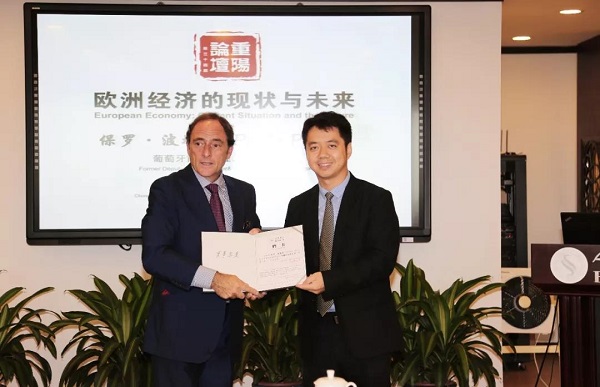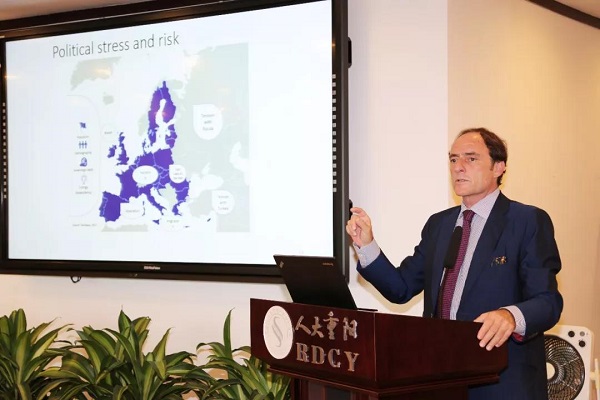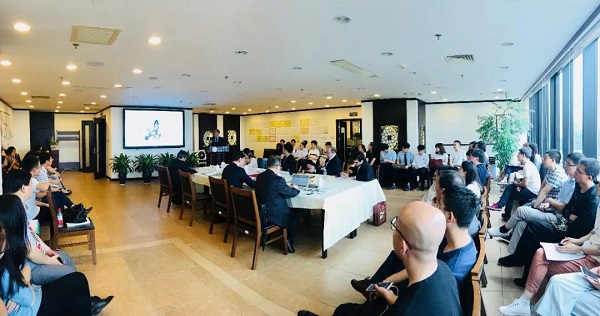Picture
Your Present Location: HOME> PictureFormer Vice PM of Portugal appointed as RDCY non-resident senior fellow
On July 18th, Paulo Portas, former vice Prime Minister of Portugal delivered a lecture themed “The current situation and future of the European economy” at Chongyang Institute for Financial Studies of Renmin University of China (RDCY), attracting nearly one hundred listeners.

Before the lecture, Wang Wen, executive dean of RDCY delivered a welcome address and awarded letter of appointment of “non-resident senior fellow of RDCY” to Mr. Portas. Henceforth, the total number of non-resident senior fellows of RDCY has increased to 44, of which 4 are former senior politicians.
Mr. Portas pointed out in his lecture that Europe has a very large internal market. Europe has a population of 500 million. Its income per capital and education level are high, and its politics and economy are relatively stable.

However, when looking at the European economy in the long run, Mr. Portas was not very optimistic. Mr. Portas mentioned that the future development of the global population will have a profound impact on the world political and economic landscape.
He mentioned that in 1950, Europe's population accounted for 22% of the world's total population, while Africa only accounted for 8%. But by 2050, Europe's population will only account for 8% of the world's total population, while Africa will account for 25%. The popularity of mobile phones and internet will promote further immigration to Europe from Africa.
If Europe does not selectively accept new immigrants, in 2050, Europe will become a very "old" society, because there is no new population to drive economic development, he said.

Mr. Portas believed that Europe should promote its investment and technology transfer to Africa. This will not only make African people’s living in better conditions, but also reduce the pressure of immigration to Europe from Africa. In the end, Mr. Portad said that Europe should be more closely united and have a more open immigration policy to maintain Europe's future economic development.
On the future economic issues, Mr. Portas noted that the future economy competition will happened between China and the United States. Seven of the top ten technology and e-commerce companies in the world are from the US and three from China, but none from Europe. In this field, China and the US occupy most of the business, and the competitiveness of Europe is declining.
According to a survey, an American changes 11 jobs in his or her lifetime in average, while a European only does 4 times in average. This also shows Europe's relatively low economic vitality, leading to no more job opportunities be available to its citizens. The proportion of US venture capital to GDP is 0.3% while Europe is only 0.03%. Last year, China’s investment in science and technology research surpasses the Europe by 0.1%. Technology innovation and research need financial support, while Europe is less than China and the US in this regard.
Finally, Mr. Portas described the future trends from a geopolitical and economical perspective. He said that from the geostrategic, the largest competitor of the US in the future is China but not Russia. Mr. Portas also highly praised China's development model, arguing that China's rise is not relying on traditional geopolitics but on geo-economics to achieve a peaceful rise in economic cooperation. He said that China and Portugal should enhance cooperation in the development of Africa and Latin America, which have great development potential. China and Portugal will have more room for cooperation in this field.























































































 京公网安备 11010802037854号
京公网安备 11010802037854号





